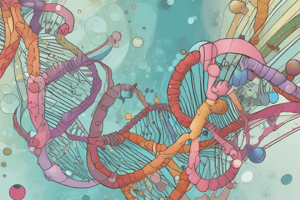Podcast
Questions and Answers
Transcription alone does not constitute gene expression. The expression of a protein-coding gene is ultimately measured by the amount of functional protein a cell makes, and much happens between the synthesis of the RNA transcript and the activity of the protein in the cell. There are more regulatory mechanisms that operate at various stages after ______ (Seminar Slide 71). These mechanisms allow a cell to fine-tune gene expression rapidly in response to environmental changes without altering its ______ patterns. i- Pre-mRNAs May be Processed by Alternative Splicing RNA processing in the nucleus and the export of mature RNA to the cytoplasm provide several opportunities for regulating gene expression that are not available in prokaryotes. One example of regulation at the RNA-processing level is alternative RNA splicing, in which different mRNA molecules are produced from the same primary transcript, depending on which RNA segments are treated as exons and which as introns. Regulatory proteins specific to a cell type control intronexon choices by binding to regulatory sequences within the primary transcript. A simple example of alternative RNA splicing is shown in Seminar Slide 59 for the troponin T gene, which encodes two different (though related) proteins.
Transcription alone does not constitute gene expression. The expression of a protein-coding gene is ultimately measured by the amount of functional protein a cell makes, and much happens between the synthesis of the RNA transcript and the activity of the protein in the cell. There are more regulatory mechanisms that operate at various stages after ______ (Seminar Slide 71). These mechanisms allow a cell to fine-tune gene expression rapidly in response to environmental changes without altering its ______ patterns. i- Pre-mRNAs May be Processed by Alternative Splicing RNA processing in the nucleus and the export of mature RNA to the cytoplasm provide several opportunities for regulating gene expression that are not available in prokaryotes. One example of regulation at the RNA-processing level is alternative RNA splicing, in which different mRNA molecules are produced from the same primary transcript, depending on which RNA segments are treated as exons and which as introns. Regulatory proteins specific to a cell type control intronexon choices by binding to regulatory sequences within the primary transcript. A simple example of alternative RNA splicing is shown in Seminar Slide 59 for the troponin T gene, which encodes two different (though related) proteins.
transcription
Flashcards are hidden until you start studying




